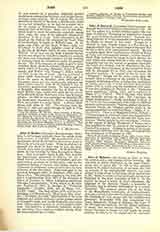

John of Cornwall (JOHANNES CORNUBIENSIS, JOHANNES DE SANCTO GERMANO) lived about 1176. He was the author of a treatise written against the doctrine of Abelard, “Eulogium ad Alexandrum Papam III, quod Christus sit aliquis homo”. Scarcely anything is known of his life except the few facts to which he alludes by chance in this work. Though he is claimed by some French writers as a Bas-Breton, it appears certain from the varied forms of his name that he was a native of St. German’s in Cornwall. He was a student under Peter Lombard and Robert of Melun at Paris, and subsequently became a teacher himself. From Peter Lombard he seems to have derived the view which that scholar held for a time, that Christ’s humanity was but the vesture or garment wherewith the Logos was clothed; but he abandoned this doctrine, which was condemned at the Council of Tours held by Alexander III in 1163, and advocated the orthodox teaching. In support of this he wrote the “Eulogium”, though not for many years after the council, since a reference in the preface to William, formerly Archbishop of Sens, as being then Archbishop of Reims, shows that it could not have been written before 1176, in which year the translation took place. It was first published by Marten in the “Thesaurus novus anecdotum” (Paris, 1717), and is reprinted in Migne, P.L., CXCIX. This is the only work which was certainly written by him. The “Apologia de Christi Incarnatione”, usually attributed to Hugh of St. Victor, has been assigned to John without sufficient grounds, as also a treatise “Summa qualiter fiat Sacramentum Altaris per virtutem sanctae crucis et de septem canonibus vel ordinibus Missae” (Migne, P.L., CLXXVII). There is at Magdalen College, Oxford, a “Commentarius in Aristotelis libros duo analyticorum posteriorum”, which may be his, and the Latin hexameters “Merlin prophetia cum expositione”, written at the request of Bishop Warelwast of Exeter, have been ascribed to him by reason of the references to Cornwall it contains. Nothing is known of his death, nor can he be identified with the John of Cornwall who was archdeacon of Worcester in 1197.
EDWIN BURTON

